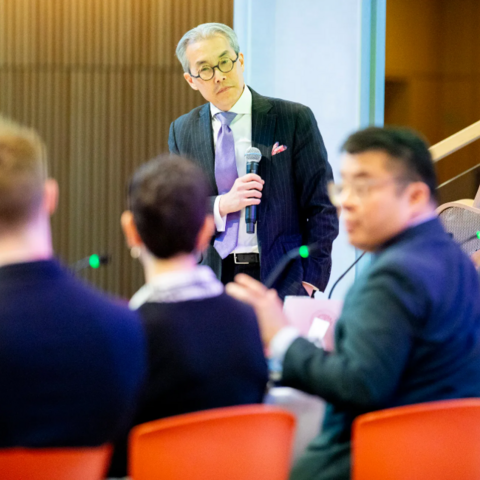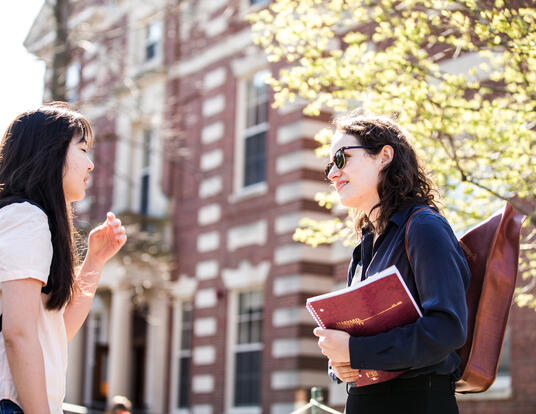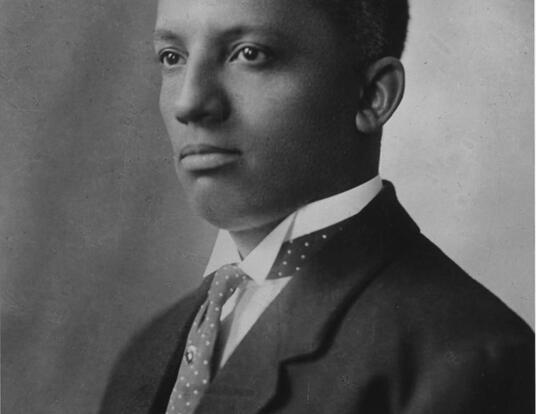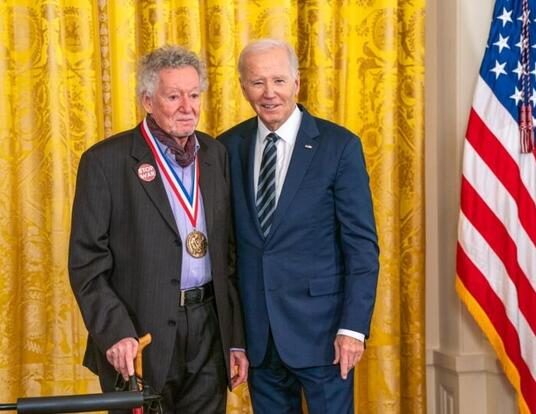Above and Beyond for LGBTQIA+ Inclusion
Alicja Majer’s devotion to the experience of queer students earns them the 2024 Hammonds Award
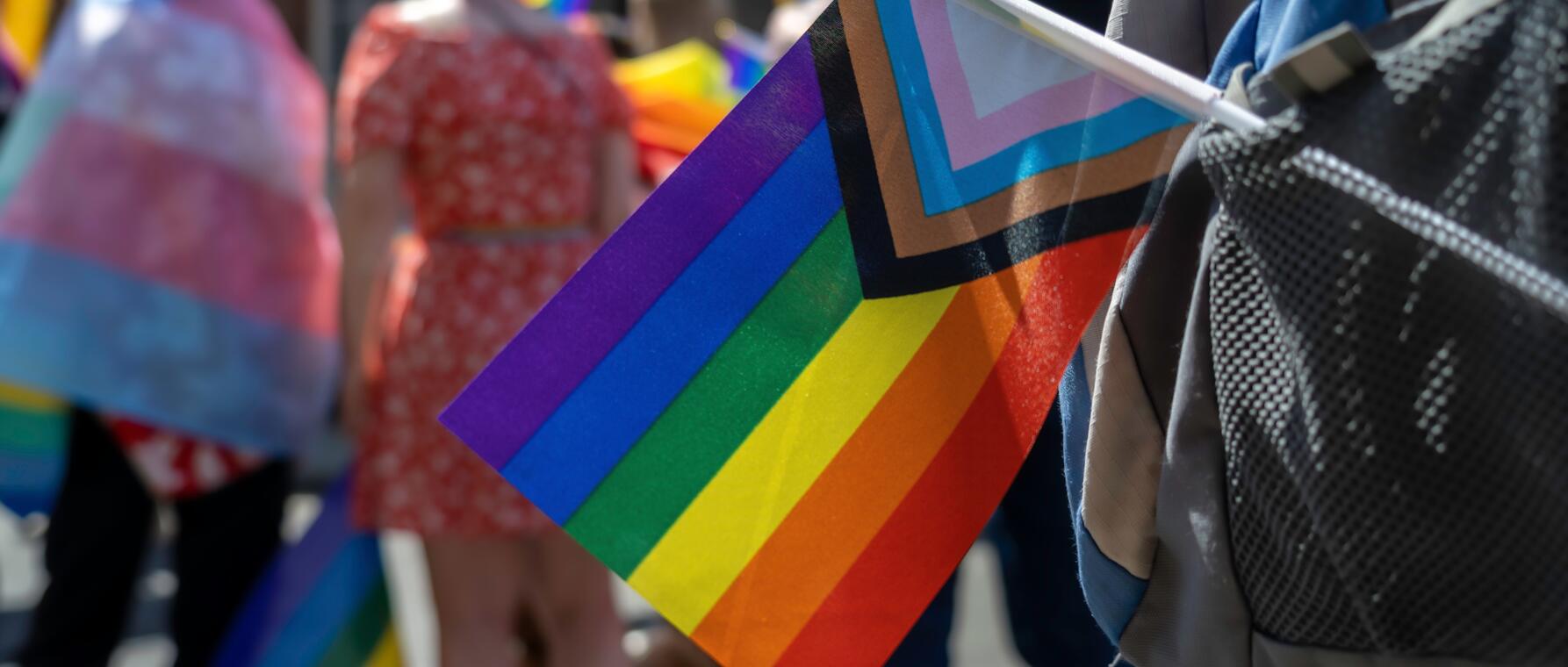
Alicja Majer tested positive for COVID-19 on the day of Harvard’s Lavender Graduation in May 2024. As a result, they were forced to watch at home via livestream a ceremony they had looked forward to attending in person—particularly in the light of the enormous role students played in organizing and planning the event. With a cup of tea in one hand and their cats by their side, they looked on and got one of the biggest surprises of their Harvard career: they had been named the 2024 recipient of the Evelynn Hammonds Award for Exceptional Service to Bisexual, Gay, Lesbian, Trans, and Queer (BGLTQ) Inclusion. The award, established in 2021 by LGBTQ@GSAS, a Harvard Griffin GSAS Student Group, recognizes those who go above and beyond to make the University a place where queer students, faculty, and staff can flourish.
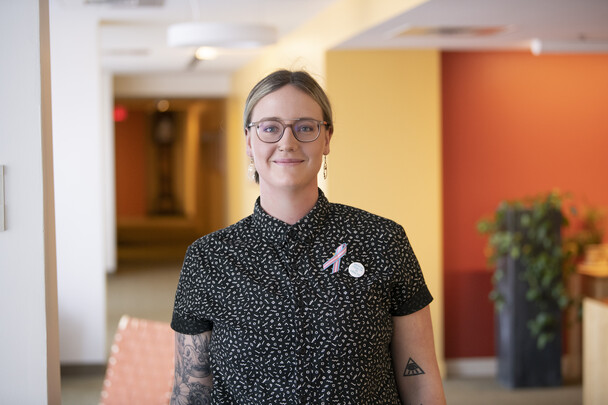
“I had no idea I was going to be honored,” says Majer, associate director for equity, diversity, inclusion, and belonging (EDIB) at the Harvard Kenneth C. Griffin Graduate School of Arts and Sciences (Harvard Griffin GSAS). “Dean Sheila Thomas, head of our EDIB team accepted the award on my behalf and then asked the students in the audience to turn to the camera and wave to me. I got really emotional. The importance of community support is something I try to highlight in my work, so it was an incredible moment. I’m so grateful.”
It’s not surprising that Majer felt a little overwhelmed by being in the spotlight. After all, they are used to focusing on the members of the School's community rather than the other way around. The Hammonds Award recognized that—whether by providing one-on-one support, helping with administrative responsibilities, or empowering Harvard Griffin GSAS students to generate ideas and vision—Majer is an advocate who addresses the needs of queer students and affirms their presence at the School.
Prevention rather than Reaction
Born in Krakow, Poland, Majer moved with their family to the United States when they were 12. “My parents wanted us to have more opportunities than were available at home,” they say. “They thought that if we moved to the US, they would be able to provide for us and maybe we would be the first generation to go to college. That has come with a slew of unexpected challenges—particularly the need for immigration reform. But my younger brothers and I are grateful to live and work here since the Deferred Action for Childhood Arrivals program was enacted in 2012.”
Majer says the unique challenges they faced as a member of two often marginalized populations—LGBTQIA+ folk and immigrants—led them to a career in social work and eventually to Harvard Griffin GSAS. They say their personal experiences taught them the importance of visibility and diversity for the emotional, mental, and social well-being of minoritized and underserved populations. Their time at Harvard has deepened that understanding.
I had no idea I was going to be honored . . . it was an incredible moment. I’m so grateful.
—Alicja Majer
“Being at the University has provided a lot of lessons,” Majer says. “There have been many wonderful, often challenging opportunities for me to expand my own concept of what being visible and authentic means.”
At Harvard, Majer works to create a safe and welcoming space for LGBTQIA+ students. And while they are acutely aware of the challenges these students face—including discrimination and harassment, lack of representation, and limited support services—they are also mindful of the obstacles faced by students from other marginalized groups, such as people of color, individuals with disabilities, or those from low-income backgrounds. “Social justice advocacy means advocacy for everyone who is oppressed in our community,” they say.
Majer’s approach to supporting queer students is rooted in prevention rather than reaction. They believe in creating a system of support that anticipates and addresses student needs before a a situation veers into crisis. This approach, they believe, lightens the emotional load of LGBTQIA+ folk at Harvard Griffin GSAS.
“It’s important to reroute and take a step back to think about what prevention looks like and how to prioritize it,” Majer says. “Visibility is one example. My role was created in part because there was a need for programming that was tangible and outwardly visible to LGBTQIA+ folks who might be feeling separated from the community. Students need to see that there are people like them here at Harvard Griffin GSAS and that they are not on their own in needing support. The impact of affirming the queer community isn’t always easy to see, but when it’s absent, it affects factors such as mental health and student success.”
Alone No More
Given the backlash against the community in recent years—the American Civil Liberties Union counts over 500 anti-LGBTQIA+ bills pending in state legislatures across the US—these are challenging times for advocates of EDIB. Despite the headwinds, Majer remains committed to advancing inclusion at Harvard. They draw strength from those they serve and the support they receive from colleagues and students.
The impact of affirming the queer community isn’t always easy to see, but when it’s absent, it affects factors such as mental health and student success.
—Alicja Majer
That community was on full display at the Boston Pride for the People Parade on June 8 when Majer marched alongside LGBTQIA+ faculty, staff, postdocs, students, and their chosen families. The joy, vibrancy, and unity Majer saw at the parade were the hard-won products of student efforts at advocacy and dialogue—conversations that could sometimes be painful. The acceptance and love they and the other marchers experienced were glimpses of the sort of environment Majer has tried to empower students to create at Harvard Griffin GSAS—work recognized by the Hammonds Award.
“It was beautiful to see people connect at Pride who hadn’t met before,” Majer says. “It puts things in perspective and brings me back to the importance of micro-interactions. Building trust takes time but we have a thousand opportunities throughout the day to connect with someone. That’s really the core of my work, to help create the space for LGBTQIA+ folks to be authentic with one another, to see each other, and to know that, at least for this moment, they’re not alone."
Get the Latest Updates
Join Our Newsletter
Subscribe to Colloquy Podcast
Simplecast


